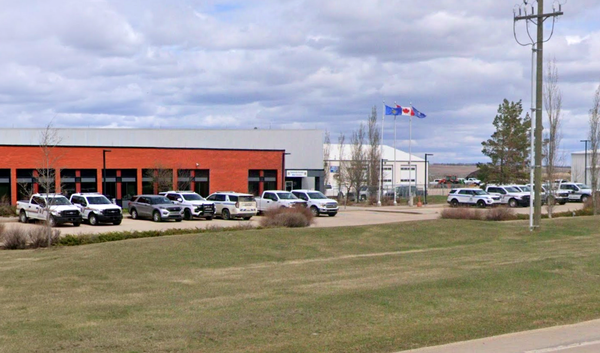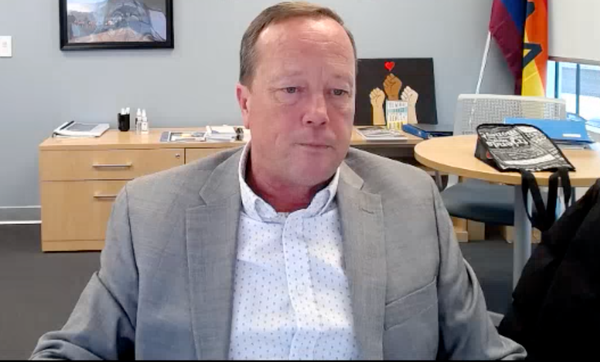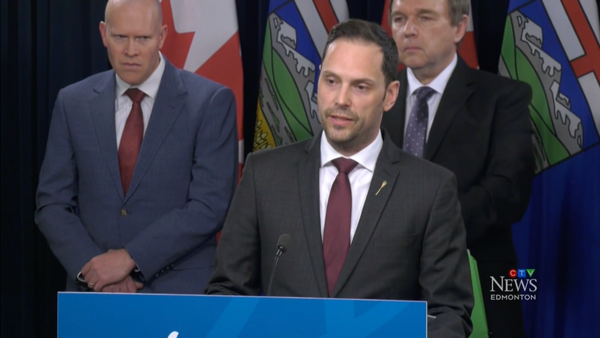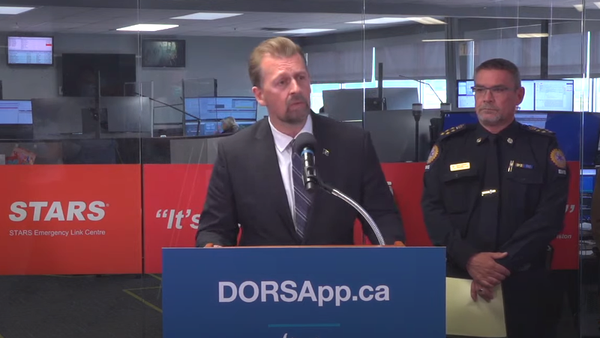Marshall Smith's human centipede
By controlling the certification pathway for addiction services in Alberta, the Canadian Addiction Counsellors Certification Foundation completes the chain from propaganda to profit.
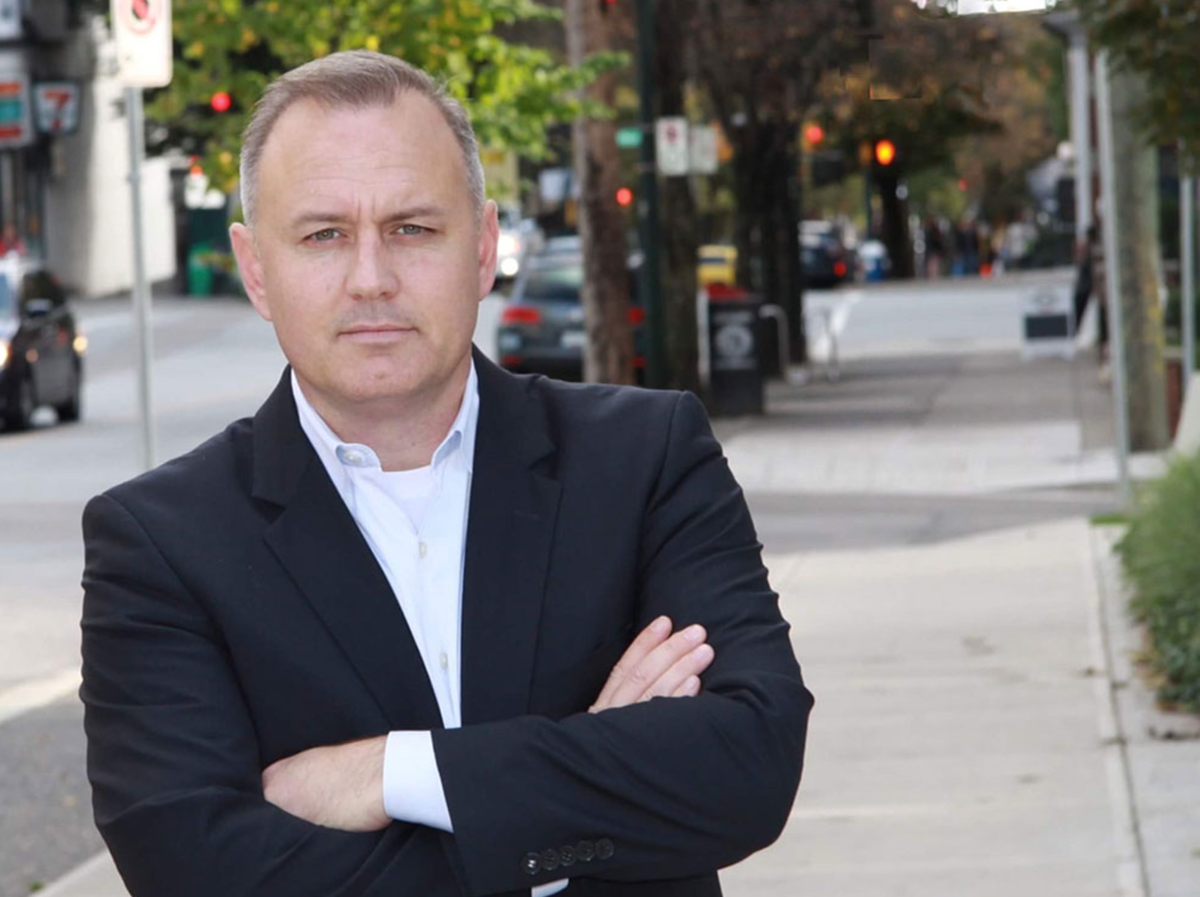
You may have read The Tyee’s August 10 discussion of Marshall Smith’s history as executive director at Baldy Hughes Therapeutic Community from 2007 until his resignation in 2011, during which time ineptitude, secrecy and patient mistreatment are detailed at the facility in an internal government report. This ‘innovative’ establishment serves as the template for eleven such centres under construction across Alberta, including in many First Nations.
A question I keep urging media to ask of elected officials like Dan Williams is who will own these centres — will they be privately operated like the new Red Deer Therapeutic Community, operated by Edgewood Health Network for $13 million a year? In addiction treatment, as in long-term care, the profit motive is life and death.
And how will these centres be regulated? What qualifications will service providers be required to hold?
In December 2021, after two years establishing standards in earnest and 18 years of advocacy by mental health professionals, the UCP announced that the creation of the College of Counselling Therapy of Alberta, or CCTA, was “no longer a priority.” This effectively abolished oversight and regulation of mental health and addiction professionals.
At the time, ACTA (the CCTA’s precursor) CEO Linda Sahli announced:
"Without regulation, mental health and addiction counsellors who have breached safety and conduct standards, for example, may continue to work with vulnerable populations in Alberta, such as children, with very little way, if any, for the public to know that they've had prior misconduct issues"
According to Sahli, it was the Canadian Addiction Counsellors Certification Foundation (CACCF) that stood in the way of setting up this regulatory body.
In late 2018, the CACCF housed Marshall Smith as board president for a half-year stint that ended at the UCP’s 2019 election win. That month, he was hired into the Mental Health & Addiction portfolio as chief of staff.
Let’s assume Sahli knows her enemy. Marshall Smith’s CACCF presidency immediately preceded his tenure as chief of staff to Alberta’s Associate Minister of Mental Health & Addiction in a government that then halted the creation of a regulatory body of trained counselling therapists.
Instead, the CACCF was installed as de facto regulatory body for addiction counselling in Alberta. At the time, Mental Health & Addiction press secretary Eric Engler told media that Marshall Smith recused himself from discussions around the CCTA to avoid a perceived conflict of interest. We certainly wouldn’t want that.
At Drug Data Decoded, we've discussed at length the lack of regulation in the increasingly privatized addiction treatment industry. Lack of oversight to protect vulnerable people is playing out in broad daylight in the sexual assault allegations against a long-time Last Door Recovery Society employee. It’s what we protested outside the Alberta Recovery Conference.
What we don't talk about enough is how public funding is fed to the UCP’s political allies to shore up this status quo.
What is the CACCF?
Formed in 1985 as the Addiction Intervention Association, the CACCF dubs itself the “gold standard certification for addiction specific counsellors in Canada.” It legitimizes its certifications through Continuing Education Units (CEUs) achievable at colleges, universities and various public and private institutions — many of which benefit directly from lack of regulation and oversight. The most common certification granted by CACCF, Canadian Certified Addiction Counsellor (CCAC), requires 270 hours of such CEU programming.
The website lists 1,768 people credentialed by CACCF, though about 20% of these are expired and another 20% are Associate Addiction Counsellors (AAC), which are not credentials but rather “endorsements” from CACCF indicating the individual is working toward an accreditation. To maintain this, an annual fee must be paid.
In their “re-certification” drop-down menu, a single course is listed for Intimate Partner Violence Training, a mandatory element of CACCF re-certification. The course is run by Harvest House, which has been “operating in the spirit of Christ since 1979.” Otherwise, I didn’t find any overt signals of religious bias on the website.
The CACCF lists five paid staff on its website and a board of directors that includes Jessica Cooksey as Corporate Secretary.
Wait — the same Jessica Cooksey who serves as Last Door Recovery Society’s Director of Operations?
The Jessica Cooksey who manufactured a moral panic around safe supply hydromorphone being diverted to youth ten days before allegations finally broke about longtime Last Door employee Adam Haber sexually assaulting dozens of women seeking recovery at nearby Westminster House?
Yes, it appears to be that Jessica Cooksey, who also serves as Chair of the Recovery Coaches Committee for CACCF. Recovery Coaches have become increasingly embedded within Alberta’s Mental Health & Addiction strategy and funding in recent years.
Recovery Coaches and the addiction gold rush
Among the folks cashing in on Recovery Coaching are David Kenney, Jason Kenney’s disgraced brother, and his wife Susan. After moving to Calgary around 2021, David and Susan opened Emergo Academy to train recovery coaches.
Recovery coaches also appear to be the wooden horse in which the Alberta Model will gain entry to Alberta classrooms. It was recently announced that Our Collective Journey received funding from Alberta Education to partner with the Medicine Hat School Board for the Recovery Coach School Program.
You may remember Our Collective Journey as the UCP government-funded organization that showed up among the endorsing organizations for North America Recovers, an American astroturf group set up to destabilize political efforts to establish overdose prevention centres in the US.

Marshall Smith’s human centipede
Let’s put it all together using the most apt imagery available.
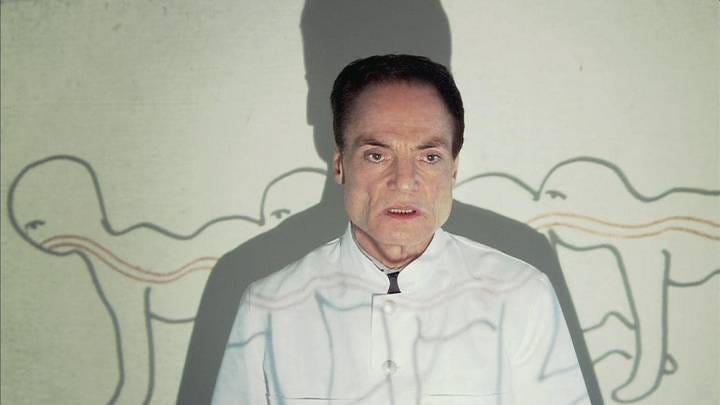
The Alberta Model isn’t perfectly linear, because there are so many people and organizations in on the grift at different stages. But if we think about those stages, the, erm, analogy holds up pretty well. The main difference is that most of these organizations are joining in willingly.
In front, facing the public, are organizations like Last Door Recovery Society leaking unfounded stories to create moral panics against solutions to unregulated drug toxicity. Other public figures who harness their platforms in similar ways include media who package up and sell fear to the public, most police chiefs and prominent politicians pandering to their base.
After all, safe supply and housing would devour the profit margins of the fear industry (police and certain news media) and private abstinence-based recovery centres. The latter increasingly rely on corporate welfare that funds unhoused people through brief abstinence stints before they’re turned back out to the streets like so many pockets of lint.
Next in this morbid chain are industry-captured policymakers, best exemplified by Marshall Smith (now chief of staff to Alberta’s Premier) digesting manufactured public opinion into policies that ensure ever-growing profits for private addiction centres. Examples of this include Alberta’s redundant supervised consumption services licensing to surveil and coerce people using SCS into the abstinence funnel, the Narcotic Transition Services that ended safe supply access in Alberta, and the Compassionate Intervention Act that will legislate police power to compel involuntary abstinence of arrested individuals.
Through these political operators, policy turns into public funding passed in large part to the most visible supporters of the UCP government’s abstinence orientation, such as Edgewood Health Network, which just increased its holdings in Alberta by $13 million per year through the Red Deer Therapeutic Community. Last Door Recovery do-si-do’s back into the lineup here, opening wide for millions in sole-source contracts to create an app.
The police fit back in here too: watch this month as Edmonton Chief Dale McFee cranks fear of unhoused people in Edmonton to a fever pitch in a well-timed effort to continue the favourable funding formula for Canada’s most expensive police force. Watch as Calgary Chief Mark Neufeld holds his silence as his officers are granted the power to compel police detainees into temporary abstinence.
Instead of quietly receiving this payback, why aren’t these chiefs following the lead of Saskatoon Chief Troy Cooper, who recently denounced forced abstinence in keeping with well established evidence on its safety and efficacy? Because you don’t look a gift horse in the mouth. Or, in this case, the butt.
Next in the centipede, hundreds of Recovery Capital Conference attendees employed within this monstrosity of Alberta’s “Recovery-Oriented System of Care” clamour to renew their CACCF designations.

Here’s where the CACCF fits into the lineup. Instead of accreditation upheld by licensed counselling therapists, which would have been supported through the CCTA, service providers at all Alberta government-funded addiction centres hold certifications and re-certifications supplied by the CACCF. Attending Recovery Capital Conference appears to be a requirement to maintain status as “Recovery Capital Professional”, though it’s unclear how many people have bought into this particular grift.
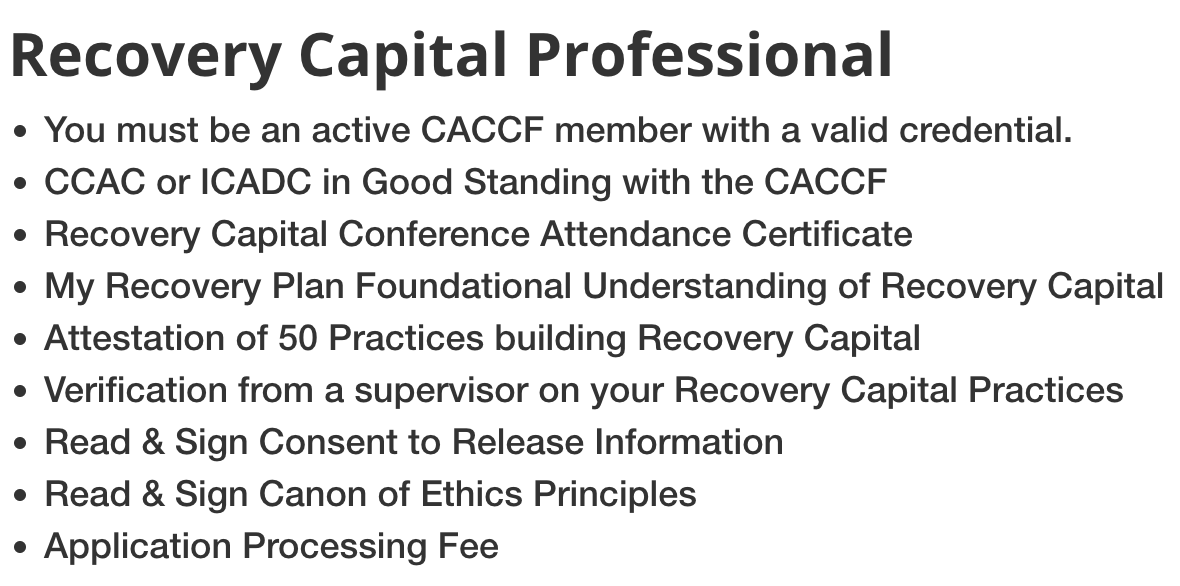
The service provided by CACCF is that it maintains a much lower professional bar than what the CCTA had in mind representing licensed clinicians — counsellors and therapists. Instead, most centres get chaplains or people brought into the field through pseudoscientific nonsense like ‘recovery capital’.
As in all things this government touches, it’s profit first, people maybe.
I asked a clinician about the CACCF. This was how they framed it:
“We started lobbying NDP in 2016 and finally got the bill passed in 2018, a year to set up and get everything approved and above standard industry par. A day before officially opening, they fucking killed it because Marshall knew his people aren't vetted to be certificated. It’s big money.”
At the tail end of the centipede are the many private “recovery” service providers who elude regulation and oversight while raking in donations, public grants and service fees.
And what, you ask, is the input at the start of this hideous chain?
Why — it's people, of course.
All this prompts an obvious question: if Recovery Capital Conference is the stitching for this grotesque Myriapod, what are the sponsors of this fall’s three Recovery Capital conventions expecting to be fed?

Drug Data Decoded provides analysis on topics concerning the war on drugs using news sources, publicly available data sets and freedom of information submissions, from which the author draws reasonable opinions. The author is not a journalist.


